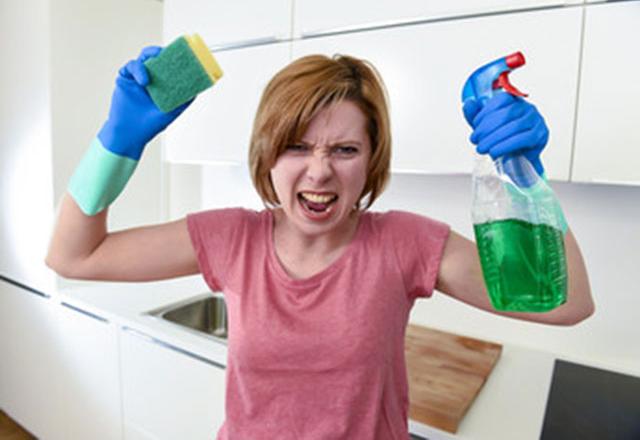You are here
Cleaning products tied to accelerated lung function decline in women
By Reuters - Mar 06,2018 - Last updated at Mar 06,2018

Photo courtesy of wordpress.com
Women with regular exposure to cleaning products may face a steeper decline in lung function over time, according to an international study.
Women who used sprays or other cleaning products at least once per week had a more accelerated decline than women who did not, the study authors wrote.
“We’re cleaning in our houses every day and every week. It’s important to have this discussion about cleaning and what we do in our homes,” said lead study author Dr Oistein Svanes of the University of Bergen, Norway.
“This doesn’t mean we shouldn’t clean — of course we need to clean our houses,” he told Reuters Health by phone. “But we need to question what chemicals we’re using and how they affect us.”
Bergen and colleagues studied more than 6,200 participants in the European Community Respiratory Health Survey. At 22 health centres in nine countries in western Europe, participants had lung function tests and filled out questionnaires three times over the course of 20 years.
On average, the survey takers were in their mid-30s when they enrolled. About half were female. Eighty-five per cent of the women said they were the person cleaning at home.
Altogether, 8.9 per cent of the women and 1.9 per cent of the men said cleaning was their occupation.
The survey used two measurements to assess lung function: forced expiratory volume per second which is the amount of air a person can forcibly exhale in a second and forced vital capacity, or the total amount a person can exhale in a second.
According to the American Lung Association, lung function slowly declines after about age 35.
Over the two decades of the study, women not working as cleaners and not involved in cleaning at home showed the slowest declines in lung function.
Compared to those women, women who used sprays or other cleaning products at least once a week had a faster decline in lung function. The decline was faster still for women who worked as cleaners.
Exposure to cleaning products was not linked to a decline in lung function for men. However, the authors admit, that may be because there were so few professional male cleaners in the study.
Declines in lung function were not linked with a higher risk for obstructive airway diseases like emphysema or asthma, however.
Still, the authors said, for women whose occupation was cleaning, the effect of exposure to cleaning products was only “somewhat less” than smoking a pack of cigarettes every day for 20 years.
“The biggest surprise was that the results were quite consistent,” Svanes said. “After following people for 20 years and taking lung capacity measurements three times, the results still stood out, even across a multi-centre, multinational study.”
While the study was not designed to prove that exposure to cleaning products causes lung problems, the authors suggest that the findings might be attributable to the irritation that cleaning chemicals cause to the mucous membranes that line the airways.
In many cases, instead of chemicals, “lukewarm water and a microfiber cloth would do it,” Svanes said. “Cleaning experts would see that as perfectly fine for most purposes.”
Future studies should investigate the types of chemicals and cleaning agents that cause the most harm, he added. Cleaning sprays, in particular, may contribute to an increased risk of asthma as particles fly in the air.
“There’s an idea that clean equals good and healthy, but this should broaden our idea of what cleaning work is and what the chemical hazards are in particular,” said Dr Margaret Quinn of University of Massachusetts in Lowell, who was not involved with the study.
Quinn is researching how home care aides who care for elderly patients are affected by cleaning tasks. In Quinn’s experimental lab, aides perform typical cleaning tasks while air monitors test air quality for off-the-shelf cleaners.
“We need to think about our products and the way we apply them,” Quinn told Reuters Health by phone. “Cleaning products, especially sprays, now contain a mix of chemicals that can cause respiratory illness.”
The fact that the study included few women who did not clean at home or work, and few men who worked as cleaners, raises a broader social question about gender and cleaning work, Quinn added.
“Cleaning at home, in hotels, at office buildings and in kitchens is still seen as women’s work, and most workers are still women,” she said. “We need to think about this societal perception and how different types of work carry occupational hazards.”
Related Articles
Two chemicals commonly used as e-cigarette flavours might harm users’ airway passages, a small experiment suggests. The results point t
The active ingredients of commonly-used sunscreens end up in the bloodstream at much higher levels than current US guidelines from health re
AMMAN — The United Nations Environment Programme (UNEP) celebrated its first “International Day of Clean Air for Blue Skies” on September 7
















